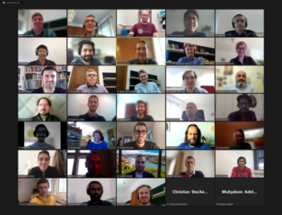The MCL has already been active in the atomistic modeling of alloy properties for 15 years. A special focus is on so-called ab-initio methods: These methods are based solely on fundamental physical equations and allow the prediction of material properties without the use of experimental parameters. A particular variant of the ab-initio methods is based on an implementation of the so-called Green's function-based density functional theory and has particular strengths when it comes to calculating alloys with many different components or complex magnetic properties. This particular method is also used in the GreenALM code, which has been under development at MCL since 2017 by a team of developers led by Dr. Oleg Peil. GreenALM stands for "Green's function based ALloy Modeling" and is able to efficiently predict even the properties of complex materials such as steels or high entropy alloys, where conventional ab-initio programs often reach their limits.
After a development period of two and a half years, a first MCL internal workshop took place in 2019. After further improvements of GreenALM, an international virtual hands-on tutorial was held in October 2021 in collaboration with the Psi-k network and the team from the Vienna Scientific Cluster.
At this tutorial, on the one hand, internationally leading researchers presented fundamentals and modern applications of atomistic modeling of alloy properties. The participants received an introduction to the GreenALM code and were able to learn and perform calculations with the code themselves using a series of prepared examples. For this purpose, the participants were given access to the high-performance computer VSC-4 in Vienna and were personally supervised by MCL tutors in small groups of 4-7 persons. The examples themselves were carried out with the help of so-called Jupyter notebooks, in which GreenALM calculations could be embedded interactively in more complex calculation processes and evaluated graphically.
A total of 80 people from 18 countries and all continents registered for the GreenALM tutorial, with the number of participants limited to 40 for the practical part. Feedback from participants was extremely positive, with an average score of 8.76 out of 10 (93% response rate).
More information can also be found at https://psi-k.net/report-on-the-virtual-psi-k-greenalm-hands-on-tutorial-2021/
In connection with the tutorial, the MCL's GreenALM web page was also completed (see https://www.mcl.at/software/greenalm/), which contains more information about how GreenALM works, what you can do with it, and how to purchase a license.
Project coordination (Story)
Dr. Jürgen Spitaler
Key Scientist Computational Materials Design
Materials Center Leoben Forschung GmbH
T +43 (0) 3842 45922-70
juergen.spitaler(at)mcl.at
Project partner
• KTH Royal Institute of Technology, Sweden
• The University of British Columbia, Canada
• Max-Planck-Institut für Eisenforschung , Germany
• Academy of Sciences of the Czech Republic, Czech Republic
• Montanuniversität Leoben, Austria
• Austrian Academy of Sciences, Austria




















